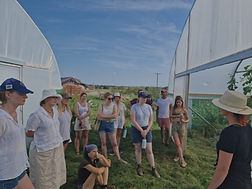
Setting the Scene
The global food system, worth roughly $8 trillion per year, is built on the need for plentiful and cheap food. As consumers we are all part of this system. Some of us are producers, processors, retailers, wholesalers, policy makers, advisers, researchers or financiers too. It's a wonderfully diverse sector to be part of.
Arguably, while the system has delivered volume and consumer choice to a percentage of the worlds growing population, it has failed to deliver a sustainable and just food future for all. It can be viewed as a depletive system based on reductionist thinking, commercial gain and corporate power. Our natural environment is not in great shape, climate change is taking its toll, and human health is suffering. Communities feel disconnected from the food they eat and the land around them. Many are under nourished. Farmers and growers feel disenfranchised.
This can not continue. We need a new food system and we must move at pace.
Many young people are frustrated and overwhelmed by the enormity of the situation they have inherited. With so much to do, it can be hard to know where to focus energy, it can feel paralysing and isolating. But with support, the next generation can spearhead the transition and turn passion for change into action.
Building a Sustainable and Just Future
We believe that the future must centre on a farming and food system built around key economic, environmental and social sustainability principles. But we question the depth and breadth of traditional sustainability thinking. After decades of depletion, billions of spend, and numerous sustainability summits, programmes and polices, we are still going backwards. Sustaining or conserving what we have today for tomorrow is not enough.
We must move beyond depletion and conservation to a position of regeneration. We must go beyond sustainability.
The transition must be just and fair, involving and respecting the diverse mix of stakeholders and our social values. It must be equitable, deliver food security for all and challenge power dynamics.
Here at Emergent Generation we believe a future based on the deep and meaningful principles of agroecology and regeneration is needed. These core principles are at our heart.
Whether you are farmer, grower, forester, conservationist, vet, adviser, investor, nutritionist, medic, teacher, retailer, chef or tourism provider........agroecological and regenerative thinking can work for you, your business, your community and our planet.
Agroecology
Agroecology is an integrated approach that applies ecological and social concepts and principles to the design and management of food and agricultural systems. Within a justice and rights framework, it seeks to minimize external inputs and optimize sustainable interactions between plants, animals, humans and the wider environment.
In simple terms it's about farming WITH nature and people. It's about synergy and diversity.
Rather than tweaking the practices of unsustainable agricultural systems and intensive efficiency drives, agroecology seeks a system wide holistic approach to transformation, addressing complex issues such as climate change, biodiversity loss, poor nutrition, knowledge exchange and corporate concentration.
Agroecology is well researched and is relevant across the globe.


Regeneration
If we are to move beyond sustainability we must focus on doing things that rebuild, enhance, improve and reconnect. At the same time we must cease activities that extract, deplete and damage. Only then will we get net regeneration.
Regenerative agriculture seeks to rebuild soil health, enhance biodiversity, and improve water and nutrient cycles. This in turn reduces reliance on artificial inputs and fossil fuel use, and can sequester more carbon in the soil.
Many enterprising regenerative farmers and growers seek to reconnect with their communities and food supply chain too, offering nutrient rich foods.
Regenerative farmers work to reduce soil disturbance (ploughing and spraying), keep the soil covered (using cover crops etc), feed the living roots and integrate livestock into their systems. Diversity of crop, stock, enterprise and people are key.
The regenerative journey is complex and your own context is important....every farm, farmer, business and community is different. It can be seen as 'greenwash' but if done well and at depth it's a game changer.
A regenerative mindset and focus on positive outcomes (rebuild, enhance, improve, reconnect) can apply to all the actors, leaders and entrepreneurs in our food system, not just primary food producers. Regenerative health, finance and tourism are all growing industries.
Want to read more about regenerative principles and farming? There's lots out there and it's an emerging field but here is a good place to start.

.png)
